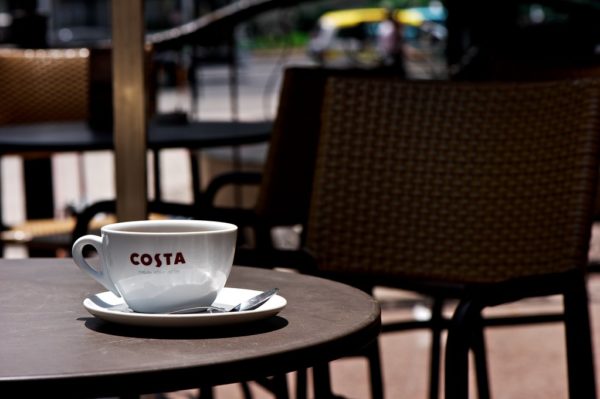Costa Coffee lobbied against ‘latte levy’ before Treasury dropped plan
Coffee giant claimed there was ‘no evidence’ tax would increase recycling and disputed whether plastic cups were really ‘single-use’

Costa Coffee claimed there was no evidence that the introduction of a 25p “latte levy” on plastic cups would increase recycling or have any impact on people who litter and warned that such a move would be seen as the government “deliberately targeting coffee drinkers”.
The biggest coffee chain in the UK, which sells just under 500 million plastic-lined takeaway cups every year, made the comments shortly before former Chancellor Philip Hammond dropped plans for a tax on single-use coffee cups, ignoring a recommendation by MPs on the Environmental Audit Committee.
While plans for a nationwide scheme were scrapped, the introduction of 25p surcharge on takeaway cups in the Houses of Parliament has been a success.
The move, which started in October 2018, has led to a 74% drop in the use of paper cups in parliament, with the number of paper cups used in Westminster cafes falling from 58,000 to 15,000 per month while having no impact on overall sales.
The news, reported in The Times, followed a trial scheme this year that showed a “latte levy” would save more than 700 million cups a year.
In its submission to a Treasury call for evidence on tackling plastic waste Costa said the government should be wary of “promoting the view that single-use plastics are not recyclable”, arguing that this could lead to consumers just throwing cups away. Waste experts say that recycling coffee cups is prohibitively expensive and technically difficult.
The company added that it is “concerned by the move to biodegradable cups” at other businesses and said the main barrier to making their cups 100% recyclable is poor infrastructure and “consumer behaviour”.
In its response, McDonald’s also pushed back on the idea that single-use plastic can only be used once, writing: “a single-use plastic has a complex definition and should be based on the recyclability of the plastic and not the number of times it is used by the end user.”
The company added “plastics play a vital role in society” and argued plastic bottles “are by far the most effective way of supplying water to consumers.”
In response to this story, McDonald’s told us the company is committed to recycling and added that since the government consultation “we’ve swapped plastic for paper straws, signed the UK Plastics Pact, and our customers can have their own water bottles refilled in our restaurants.”
In its submission, Coca-Cola acknowledged that that “public awareness of the potential negative impacts of single-use plastics has risen considerably in the last twelve months,” but added: “however, the benefits of plastics cannot be ignored.”
Hammond announced his plan for a tax on all plastic packaging containing less than 30% recycled content from April 2022, in his budget speech last year. The former Chancellor said the move was part of the UK’s efforts to become “a world leader in tackling the scourge of plastic littering our planet and our oceans.”
Unearthed reported in May that the UK’s leading plastics trade group, the British Plastics Federation (BPF), had pushed to weaken the proposed tax, despite its own analysis saying the tax would significantly boost the use of recycled plastics in packaging.
The BPF, which represents over 500 manufacturers including oil giant Exxon Mobil, lobbied the Treasury to delay the introduction of the tax and possibly start with a lower threshold on recycled content, according to leaked meeting minutes.
In submission to the consultation, the Paper Cup Alliance, a group which represents “leading companies involved in the manufacture of paper cups in the UK”, cited research by the consultancy Equity claiming that a levy on paper cups “would double the number of job losses at Toys R’Us and Maplin” and cost the Treasury £173m in job losses.

